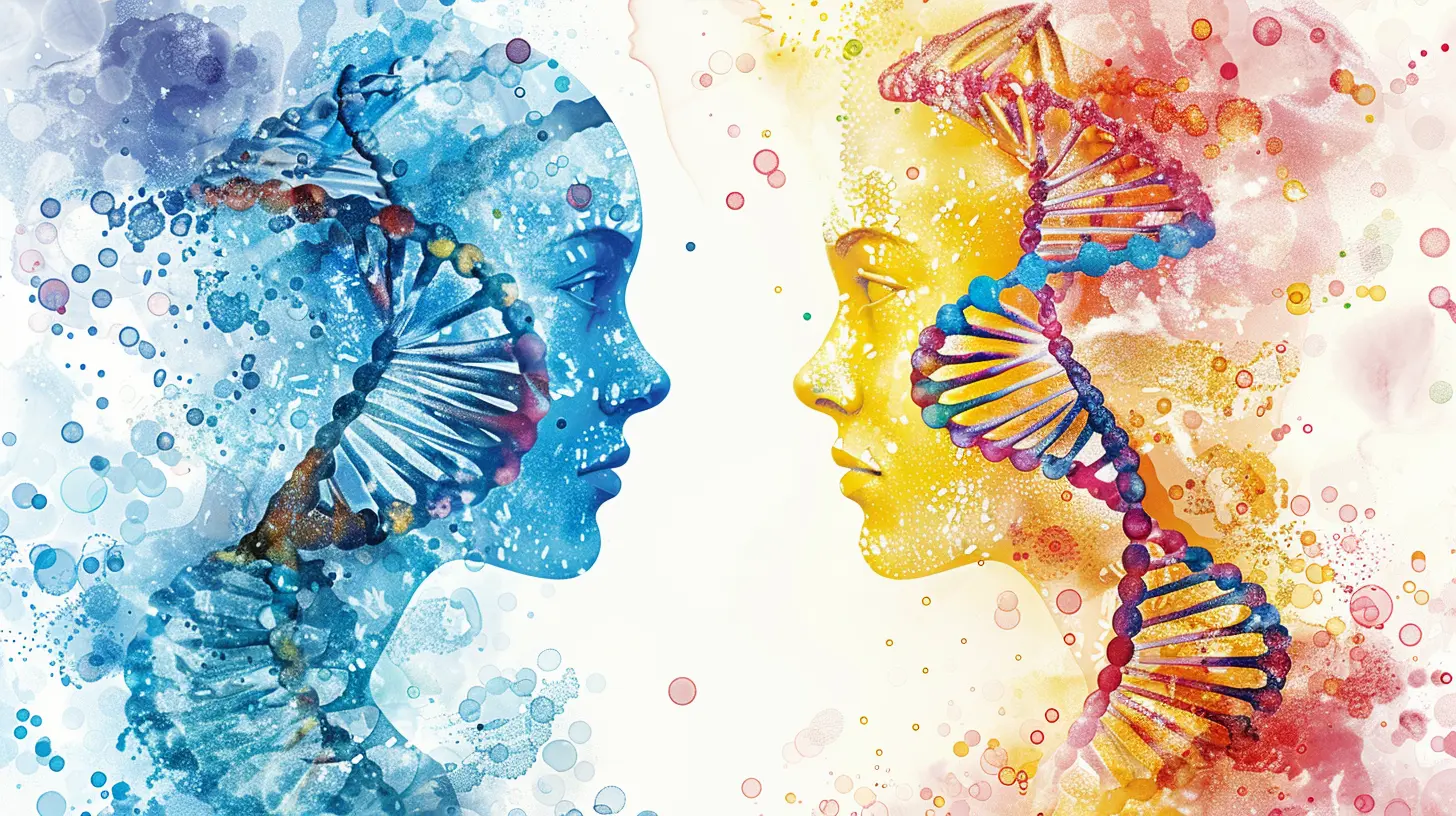The Role of Genetics in Mental Health Disorders
8 November 2025
Have you ever wondered why mental health disorders seem to run in families? Maybe your parent struggled with anxiety, and now you find yourself dealing with the same thing. Or perhaps you’ve heard someone say, “It’s in my genes.” Well, they're not entirely wrong.
Mental health is a complex puzzle made of many pieces — our environment, our experiences, our lifestyle choices, and yes, our genetics. In this post, we’ll dive into the fascinating world of mental health and genetics, breaking things down in a way that’s easy to understand, engaging, and maybe even a bit eye-opening.

What Does Genetics Have to Do With Mental Health?
Let’s start from the top.Genes are like the instruction manual for our bodies and brains. They carry information that shapes everything from the color of our eyes to how our neurons communicate. So, it’s no surprise that they might influence our mood, behavior, and risk for mental illness too.
Now, don’t get me wrong — genes aren’t the whole story. They’re just part of the equation. Think of your mental health like a recipe. Genetics might be the base ingredients, but life — stress, trauma, relationships, sleep, food, and more — adds the spices.

Are Mental Health Disorders Hereditary?
Great question.Some mental health disorders do tend to run in families, which strongly suggests a genetic link. But remember, “hereditary” doesn’t mean inevitable. Just because your dad had depression doesn’t guarantee you will too. It just means you may have a higher risk.
Here are a few mental health conditions that show strong genetic components:
- Depression
- Anxiety disorders
- Bipolar disorder
- Schizophrenia
- Autism spectrum disorder
- ADHD (Attention Deficit Hyperactivity Disorder)
Let’s dig deeper into a few of these.

The Genetics Behind Common Mental Health Disorders
1. Depression
Depression is like this heavy fog that rolls in and refuses to lift. While life events and stress play a big role, studies show that genes account for about 40–50% of the risk for depression.There isn’t a single “depression gene.” Instead, it’s a mix of many small genetic variations that, when combined, increase the risk — like a slow build-up of storm clouds before a downpour.
2. Anxiety Disorders
Ever feel like your mind is running a million miles an hour with worry? You’re not alone.Anxiety can run in families, and research suggests a 30–40% genetic contribution to these disorders. But again, it’s not fate. Life experiences, especially during childhood, heavily influence whether those anxious tendencies become a diagnosable disorder.
3. Schizophrenia
Schizophrenia is a complex and often misunderstood condition. It affects how people think, feel, and behave. The hereditary link here is strong — if a close relative has it, your risk increases. In fact, having a parent or sibling with schizophrenia gives you about a 10% risk (compared to 1% in the general population).But notice something? Even with a strong family history, the majority of people still don’t develop the condition. That’s genetics and environment in action again.
4. Bipolar Disorder
Bipolar disorder is marked by swings in mood — from high, energetic phases (mania) to deep lows (depression).The genetic link here is also significant. About 60–80% of the risk may come from your genes. If one identical twin has bipolar disorder, the other has about a 70% chance of developing it, too. That’s pretty telling.
5. Autism Spectrum Disorder (ASD)
Autism is known to have one of the strongest genetic components of any mental health condition. Siblings of a child with autism are significantly more likely to be diagnosed as well, and studies suggest a genetic influence of up to 90%. That’s huge.Still, genes don’t tell the whole story. Environmental factors, especially during pregnancy, are thought to play a role too.

Is There Really a “Mental Illness Gene”?
Ah, the million-dollar question.The short answer? No — at least not in the way we think about it.
Most mental health disorders are polygenic. That’s a fancy word meaning many different genes, each contributing a small piece to the bigger picture. Think of it like a recipe again — no single ingredient makes the dish, but take a bunch of them together, and you get something entirely new.
Plus, the same genes can show up in more than one disorder. For example, the same genetic variation might slightly increase your risk for both depression and anxiety. That’s why someone in your family might have OCD, while you deal with panic attacks.
Nature vs. Nurture: Who Wins?
Here’s where things get interesting.The age-old debate of nature vs. nurture has shifted. It’s not an either-or situation anymore — it’s a dynamic dance between your genes and your environment.
This concept is called gene-environment interaction. It means that your genes can make you more sensitive to certain environmental factors. For example:
- A genetic risk for depression might only show up if you experience trauma.
- You might inherit a vulnerability to anxiety, but a loving and secure childhood buffers you from developing a disorder.
Your genes load the gun, but your environment pulls the trigger — or doesn't.
What About Epigenetics?
Let’s get a little geeky for a moment — but stick with me, it’s cool stuff.Epigenetics is the study of how your environment can turn genes on or off. Picture your genes like light switches — epigenetics decides which ones get flipped.
Stress, trauma, diet, sleep, relationships — all these things can change how your genes are expressed. And what’s wild? Some of these changes can even be passed down to your kids. That’s right — your stress might affect your grandchildren. Mind-blowing, right?
Can You Get a Genetic Test for Mental Illness?
Wouldn’t it be amazing if we could just take a genetic test and predict every mental health risk? We’re getting there… but we’re not quite there yet.Right now, genetic testing for mental health isn’t widely used clinically. The results are just too complex to give black-and-white answers. However, genetic research is exploding, and new discoveries are made every day.
Some companies offer personal genetic testing for traits like anxiety or ADHD predisposition, but take those with a grain of salt. They might tell part of the story — not the whole.
Why Understanding Genetics Matters
Even though we can’t change our genes, knowing our genetic risks can be incredibly empowering. Here’s why:- Early intervention: If you know mental illness runs in your family, you can watch for early signs and get help quickly.
- Preventive care: You can make lifestyle changes (sleep, exercise, therapy) that reduce your risk.
- Less stigma: Understanding that mental illness has biological roots can combat the shame that still surrounds it.
- Personalized treatment: In the future, genetic insights could help doctors tailor treatments — like choosing the right antidepressant based on your DNA. That’s real progress.
You Are More Than Your Genes
Let’s pause for a second, because this is important.Just because you have a genetic risk doesn’t mean you’re broken. It doesn't define you. It doesn’t doom you. Genetics are just one part of your story — not the whole book.
You have power. You can build habits that support your mental health. You can go to therapy, take medication if needed, create boundaries, and surround yourself with people who lift you up. You can rewrite the narrative.
Final Thoughts
The role of genetics in mental health disorders is a fascinating, ever-evolving field. We're learning more every day — but one thing’s clear: our mental health is a mix of inherited traits and lived experiences.So yes, your DNA matters. But your choices, your resilience, your support system — they matter just as much, if not more.
If mental health disorders run in your family, don’t panic. Use that knowledge as fuel to build a life that supports your well-being.
Because in the end? You’re not your genes. You’re you — and that’s more powerful than you might think.
all images in this post were generated using AI tools
Category:
Mental IllnessAuthor:

Eliana Burton
Discussion
rate this article
1 comments
Reese Dodson
This article does a fantastic job of highlighting the complex interplay between genetics and mental health. Understanding these factors can empower us to seek better support and foster resilience. Great read!
November 9, 2025 at 5:50 AM

Eliana Burton
Thank you for your thoughtful feedback! I'm glad you found the article informative and impactful.


